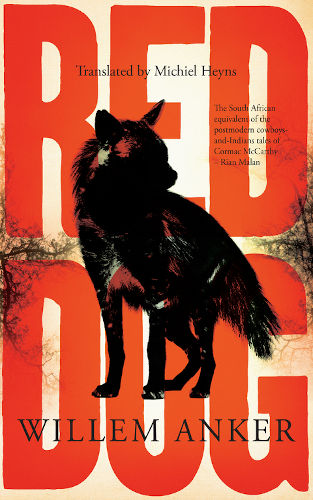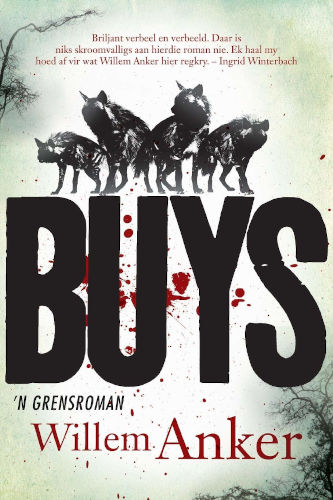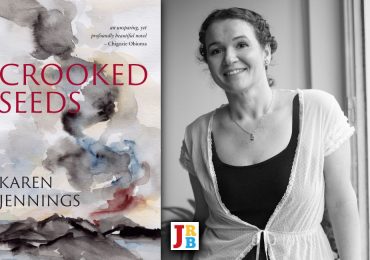The JRB Editor Jennifer Malec talks to Willem Anker about his novel Red Dog, which was recently longlisted for the International Booker Prize.
Red Dog
Willem Anker, translated by Michiel Heyns
Kwela, 2018
Buys
Willem Anker
Kwela, 2014
Jennifer Malec for The JRB: First, we must congratulate you on being longlisted for the International Booker Prize. You and the book’s translator Michiel Heyns are the first South Africans to be nominated for the prize in its present format. Of course, you won a number of local awards for Buys, but what does the international recognition mean to you?
Willem Anker: It is obviously a great honour to be on the longlist. To get international recognition like this is a great incentive to try again.
The JRB: The novel tells the tale of a real person: Coenraad de Buys, a rebellious frontiersman, reported to be nearly seven feet tall, who terrorised the Cape Colony during the early part of the nineteenth century. Why rewrite this story now? Why resurrect Coenraad de Buys?
Willem Anker: It is the story of a fascinating man, marginalised by canonical history in South Africa. He lived between worlds, between races, at a time when the boundaries, and literal borders, between the cultures in South Africa began to harden. His legend is one of a man with a disdain for all boundaries and borders, for every form of colony.
What drew me to the story was not just the events, fascinating as they are, but also the fact that as soon as he moves beyond the borders of the Colony, the historical facts become scarcer and the legends take over. It was a piece of history with a lot of room for fiction.
What I did learn from the historical facts was that he was a man of many contradictions. In one instance he is a freedom fighter, in the next he is a heinous criminal. An anarchist, outlaw from a corrupt Dutch East India Company, but also a man not without the utmost cruelty. It makes for an interesting character to write. Sometimes his actions are known facts, but the motivations you have to imagine.
The JRB: At one point, Buys says, ‘The past is not dead, it’s not even past’ (pace Faulkner), and as with a lot of good historical fiction we find our present moment reflected in Buys’s world in many ways. Were there any aspects of this period in history that seemed particularly familiar when you were researching the novel?
Willem Anker: Yes, I believe Faulkner was right about the past. When I read that history and today’s news feeds, I see the same cycles of violence, the same corrupt state institutions, the clashes between different tribes, issues about land, multinational companies (like the Dutch East India Company) colonising the world, the same angry boys looking for their mothers.
The JRB: I grinned with recognition when Buys proclaims mischievously, during a mini-rebellion in a frontier town, ‘France stands by all nations that overthrow their rulers!’, adding, to the reader, ‘Here on the frontier you can holler what you like. Stories and rumours wipe one another out.’ So he would have been very familiar with our modern concept of fake news. How do you think he would have fitted in in our current political moment?
Willem Anker: I think he would have fitted in very well. ‘I’m in service of the kingdom of take what you can before this place takes what you have’, he says. It seems to me the motto of many politicians here at the end of the world in the Anthropocene, or, more locally, many politicians in a captured state. He looked out for himself, played one party off against another, was a great orator and a charmer. Left or right, he could play both sides, whatever side gave him the most gunpowder or elephant teeth.
The JRB: At points throughout the novel, Buys disputes the historical record of his crimes and escapades. What kind of research did you do to piece together his story, as well as those of the other characters, and the wider historical background?
Willem Anker: Coenraad de Buys is a historical figure, but also a folk legend. My working rule was that I would keep to the facts, where they were to be found. There are big gaps in the historical record of his life. Sometimes the ‘facts’ were contradictory, and then I had to choose which ‘truth’ would suit the story best. I tried to sketch one possible Buys by using the facts and legends at my disposal, with the fiction stitched in.
I read up on his life, but also on his times. My wife and I also took road trips across the country in his footsteps to see what he would have seen. Lucky for us, most of the places he stayed are now nature reserves or big game farms, so the natural landscape was still recognisable to an extent.
You cannot understand a character without also knowing a bit about his time and place in the world. What do the rock paintings look like on the farm he was born? How does a musket work? What is the price of a wagonload of butter in 1799?
The JRB: Because Buys speaks many languages, he is able to move among different types of people and different races. At one point he says, ‘My voice was the voice of both sides’, and he sometimes uses his position as a translator and mediator to his advantage. To me it seems that Buys’s power over language was central to creating his own position of power.
Willem Anker: I fully agree. He could read and write. Apparently he was a good speaker. He spoke the major languages. He could translate. He was a man of shrewd words. He was seven feet tall and a great shot, but it is exactly as you say, his mastery over language and languages was one of the most important elements that differentiated him from his fellow rebels, that made him the powerful and legendary figure that he became.
The JRB: This leads somewhat into my next question, which is about translation. Did Michiel Heyns at any point curse you for your long sentences? Just kidding! But could you perhaps speak a little bit about how the process worked? Do you think the English novel feels different to the original?
Willem Anker: Michiel sent me parts of the translation as he progressed and then we had a coffee and a chat about it. I think he totally captured the essence of the original. I could not ask for a better translation. Thank you again, Michiel.
The JRB: There has been some chatter (here and here) about the influence of Cormac McCarthy on this novel, specifically about some passages that are adapted from Blood Meridian, and in fact you acknowledge this and other sources at the end of the English edition, adding that Buys himself ‘plunder[ed] the texts of others far and wide in order to tell his own tale’? What led you to this kind of rewriting?
Willem Anker: I chose the narrator Omni-Buys, the legend that survived a historical figure, as a persona that could relate his own life by using the history books and the tall tales told about him. Of course he also tells a lot of stories he makes up himself when the historians could not cross the colonial border and where the tall tales fall silent. But he also incorporates the work of other authors. He is having a conversation with books, films and readers alike. By using quotes from and allusions to other texts to tell his own tale, he hopes to signal the patchwork that is his-story, the fiction that is history, and the way these texts speak with his own. I hoped that the presence of these playful rewritings and quotes, when noticed, would enrich the broader conversations his story wants to engage in.
The JRB: Towards the end of the book, Buys says, ‘They say you lose the seed of freedom when you can no longer be bored.’ This was such a striking aphorism—and it speaks so searingly to us today, with our never-ending stream of social engagement—that I tried to find its original, but couldn’t. Did you invent it? Could you talk a little about the significance of the idea?
Willem Anker: I wrote the first draft of Buys eight years ago, so I can’t remember where that line comes from. The ‘they say’ suggests I probably read it, or something like it, somewhere, and that unfortunately it’s not mine. It sounds very much like Martin Versfeld.
I long to be bored. I spoke to a poet the other night and he told me sloth was his favourite sin—it is in the quiet, boring hours, days, when the poems come, not after a meeting. I envy Buys his freedom to be bored under his tree, although it frustrated him. It is not easy being bored. It is a difficult freedom to master. It is a lost art.
The JRB: A lot of people have called this an ‘ambitious novel’. It is your first novel to be translated into English, but your debut, Siegfried, was published in 2007, and you are the author of a number of plays as well. Did you set out to write an ambitious novel with Buys? Did it feel ambitious while you were writing it?
Willem Anker: It did get a bit away from under me; it took over. I set out to write a novel of about 150 to 180 pages, something short and not so sweet, but the more I read up on Buys and his times, about the philosophy of building houses and the mechanics of loading guns, the more I realised there was so much more story to be told.
The JRB: Finally, we like to ask authors we interview for their book recommendations, as they’re usually the best source for discovering new reads. So, what have you been reading recently that you would recommend?
Willem Anker: Richard Powers’s The Overstory, Ingrid Winterbach’s Die troebel tyd (The Troubled Times of Magrieta Prinsloo), Michel Houellebecq’s Serotonin.








6 thoughts on “‘I had to choose which “truth” would suit the story best’—Willem Anker chats to Jennifer Malec about his novel Red Dog”